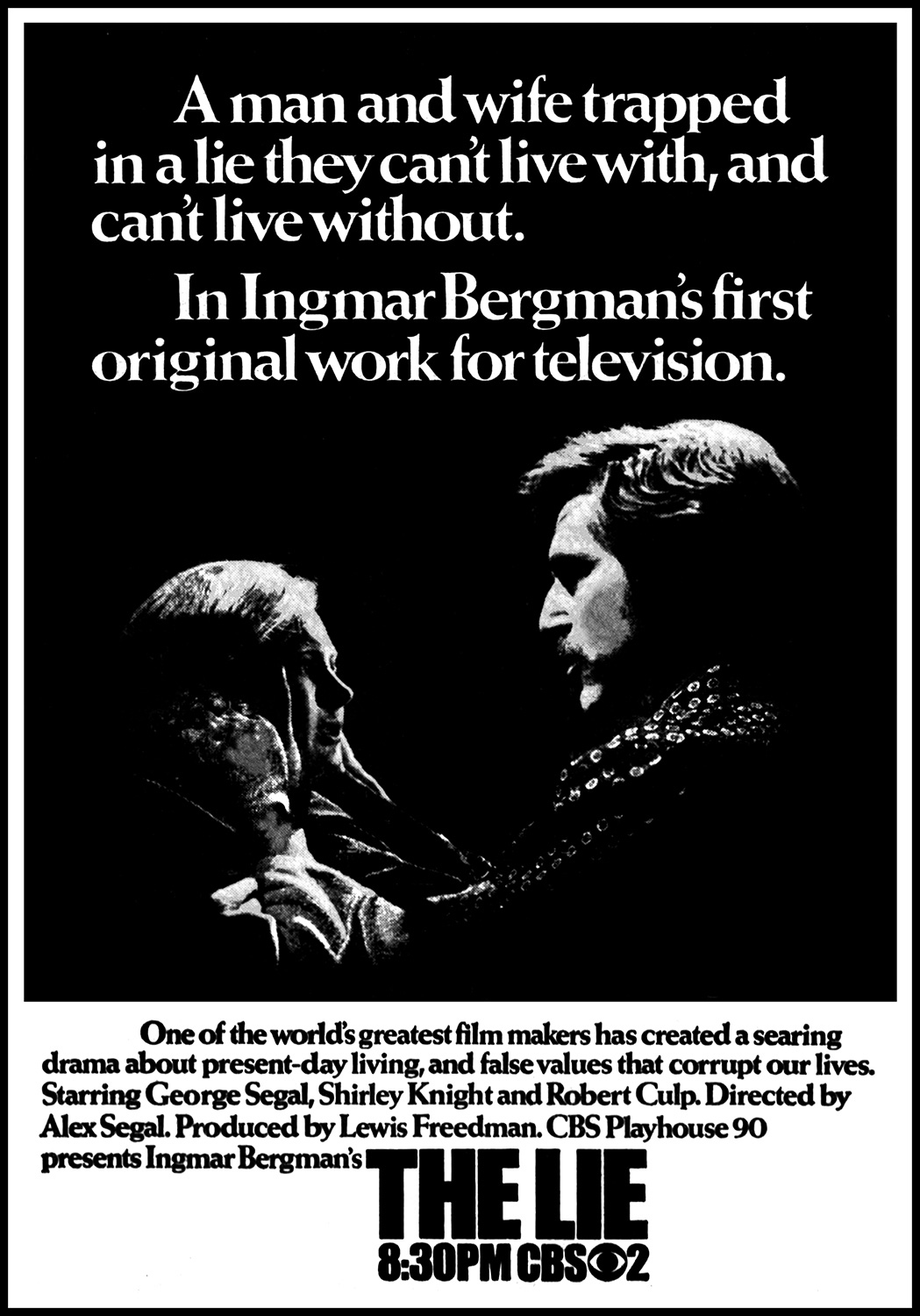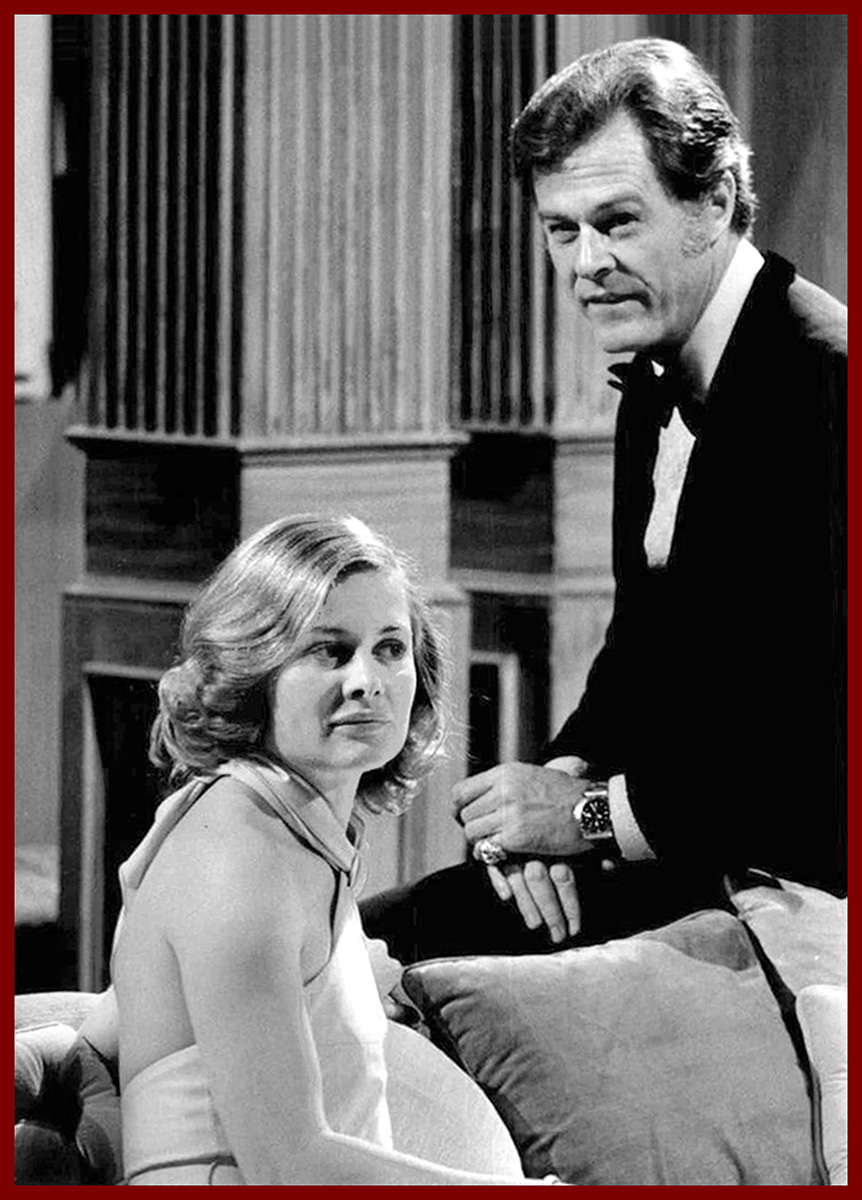|
 First telecast on April 24, 1973 as a CBS PLAYHOUSE 90 presentation, this exploration of a passionless marriage in the midst of its collapse slowly builds with desperation, until emotions explode in the final act. Tackling relationships, infidelity, aging, and regrets, its teleplay was written by Ingmar Bergman, so it's no surprise that the project attracted such high-profile as Oscar nominees George Segal and Shirley Knight. Initially produced for Swedish television in October 1970, and quickly followed by a British version starring Frank Finlay and Gemma Jones for BBC's PLAY FOR TODAY, this elevated domestic drama -- subtitled "A Tragi-Comedy of Banality" -- is challenging, unflinching and steeped in melancholia... Its story is centered around Andrew (Segal) and Anna (Knight) Fromm. He's a 40-year-old architect, she's a 34-year-old college professor, and they have two children, a spacious home, separate bedrooms, and an absence of honest communication. Early on, the two go about their usual routine. Andrew is frustrated at work, after his ideas are ignored by his boss (Victor Buono) in favor of younger staffers. Anna has a busier day -- she visits her institutionalized brother (William Daniels), an alcoholic writer tormented by depression, with an affinity for women's makeup and jewelry; goes to the library and runs into a distressed friend (Louise Lasser) who sees through Anna's perfect veneer; enjoys an afternoon tryst with married Lawrence (Robert Culp), her secret lover for the last eight years; and finally checks in with her father (Dean Jagger), a guilt-spewing curmudgeon battling his own demons. Meanwhile, Andrew finds one excuse after another to avoid going home after work, whether it's giving his secretary a lift, contemplatively sitting alone in a bar or flirting with a sympathetic nurse (Mary Ann Mobley)... In the final half-hour of this 98-minute work, Andrew and Anna attend a posh dinner party full of insufferably
First telecast on April 24, 1973 as a CBS PLAYHOUSE 90 presentation, this exploration of a passionless marriage in the midst of its collapse slowly builds with desperation, until emotions explode in the final act. Tackling relationships, infidelity, aging, and regrets, its teleplay was written by Ingmar Bergman, so it's no surprise that the project attracted such high-profile as Oscar nominees George Segal and Shirley Knight. Initially produced for Swedish television in October 1970, and quickly followed by a British version starring Frank Finlay and Gemma Jones for BBC's PLAY FOR TODAY, this elevated domestic drama -- subtitled "A Tragi-Comedy of Banality" -- is challenging, unflinching and steeped in melancholia... Its story is centered around Andrew (Segal) and Anna (Knight) Fromm. He's a 40-year-old architect, she's a 34-year-old college professor, and they have two children, a spacious home, separate bedrooms, and an absence of honest communication. Early on, the two go about their usual routine. Andrew is frustrated at work, after his ideas are ignored by his boss (Victor Buono) in favor of younger staffers. Anna has a busier day -- she visits her institutionalized brother (William Daniels), an alcoholic writer tormented by depression, with an affinity for women's makeup and jewelry; goes to the library and runs into a distressed friend (Louise Lasser) who sees through Anna's perfect veneer; enjoys an afternoon tryst with married Lawrence (Robert Culp), her secret lover for the last eight years; and finally checks in with her father (Dean Jagger), a guilt-spewing curmudgeon battling his own demons. Meanwhile, Andrew finds one excuse after another to avoid going home after work, whether it's giving his secretary a lift, contemplatively sitting alone in a bar or flirting with a sympathetic nurse (Mary Ann Mobley)... In the final half-hour of this 98-minute work, Andrew and Anna attend a posh dinner party full of insufferably  pompous boors, including Lawrence and his wife, which leads to an emotionally and physically brutal climax when the Fromms return home. Confessions are made, with Andrew blindsided by the truth about Anna's lengthy affair, resulting in a devastating scene of marital pain and violence (complete with an axe-wielding Segal!)... On the surface, it might seem difficult to care about the relatively trivial problems of white, affluent, suburban professionals, but Bergman's prose and a superb cast keeps this collection of broken, dissatisfied people compelling. Segal is customarily solid, but it's Knight who shines in her chilly, conflicted and confidently clueless role. Meanwhile, Bergman's teleplay brings out the very best in every cast member. Future ST. ELSEWHERE Emmy-winner Daniels appears in only one scene, but creates a heart-wrenching portrait of quiet desperation. Allan Arbus, Ann Prentiss, Robert Easton, and Milton Selzer appear as dinner party guests, Robert Emhardt plays a fender bender "busybody," and a young John Ritter is one of Andrew's cocky work colleagues. Director Alex Segal's resumé is littered with prestigious TV productions, including adaptations of Arthur Miller's DEATH OF A SALESMAN (starring Lee J. Cobb) and THE CRUCIBLE (with George C. Scott and Tuesday Weld), and his unstylish, workmanlike approach is perfect for the stark, downbeat material. Although this impressively frank view of marriage is the furthest thing from a feel-good story -- particularly for US commercial television -- nevertheless, THE LIE was a Nielsen Ratings smash with a 37 share and 30 million viewers, perhaps due the film's "mature" warnings and (now barely) risqué bedroom sequences. Additional Fun Fact: its wardrobe designer was Joel Schumacher. pompous boors, including Lawrence and his wife, which leads to an emotionally and physically brutal climax when the Fromms return home. Confessions are made, with Andrew blindsided by the truth about Anna's lengthy affair, resulting in a devastating scene of marital pain and violence (complete with an axe-wielding Segal!)... On the surface, it might seem difficult to care about the relatively trivial problems of white, affluent, suburban professionals, but Bergman's prose and a superb cast keeps this collection of broken, dissatisfied people compelling. Segal is customarily solid, but it's Knight who shines in her chilly, conflicted and confidently clueless role. Meanwhile, Bergman's teleplay brings out the very best in every cast member. Future ST. ELSEWHERE Emmy-winner Daniels appears in only one scene, but creates a heart-wrenching portrait of quiet desperation. Allan Arbus, Ann Prentiss, Robert Easton, and Milton Selzer appear as dinner party guests, Robert Emhardt plays a fender bender "busybody," and a young John Ritter is one of Andrew's cocky work colleagues. Director Alex Segal's resumé is littered with prestigious TV productions, including adaptations of Arthur Miller's DEATH OF A SALESMAN (starring Lee J. Cobb) and THE CRUCIBLE (with George C. Scott and Tuesday Weld), and his unstylish, workmanlike approach is perfect for the stark, downbeat material. Although this impressively frank view of marriage is the furthest thing from a feel-good story -- particularly for US commercial television -- nevertheless, THE LIE was a Nielsen Ratings smash with a 37 share and 30 million viewers, perhaps due the film's "mature" warnings and (now barely) risqué bedroom sequences. Additional Fun Fact: its wardrobe designer was Joel Schumacher.
© 2025 by Steven Puchalski.
|